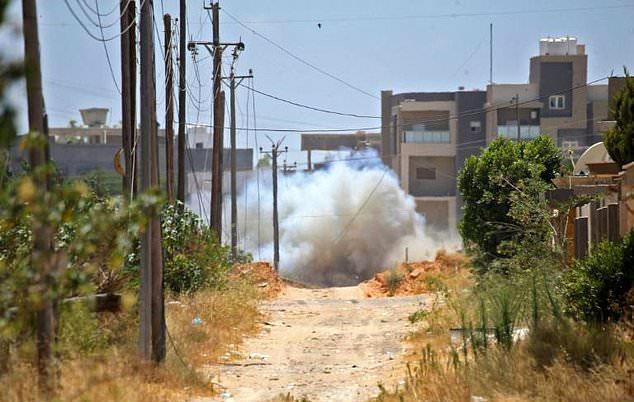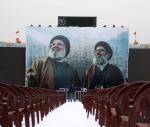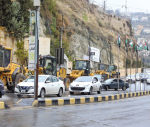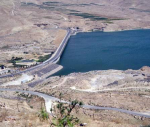You are here
Libya oil corp, central bank rally around unity gov’t
By AFP - Apr 03,2016 - Last updated at Apr 03,2016

Pro-UN-backed government protesters hold placards and shout slogans during a demonstration in the Libyan capital Tripoli on Friday (AFP photo)
TRIPOLI — Libya's National Oil Corporation and Central Bank, backbones of its wealth, have thrown their support behind a UN-backed unity government in a blow to a rival administration refusing to cede power.
The two institutions, which have struggled to remain neutral since Libya's 2011 armed revolt and subsequent turbulence, said they welcomed the Government of National Accord (GNA), in separate statements.
Prime minister-designate Fayez Al Sarraj and members of the GNA arrived Wednesday in Tripoli where a rival government, unrecognised by the international community, has ruled since mid-2014.
The Tripoli administration, established after the powerful Libya Dawn militia alliance overrun the capital that year, has demanded that Sarraj leave or surrender, branding the GNA "illegal".
Founded in 1970, the National Oil Corporation (NOC) is based in Tripoli where Libya's Central Bank — the depositor of the country's oil wealth — also has its headquarters.
They have continued to operate independently despite the chaos that engulfed Libya after the 2011 uprising that toppled and killed Muammar Qadhafi.
"We have been working with Prime Minister Sarraj and the Presidency Council to put this period of divisions and rivalry behind us," NOC Chairman Mustafa Sanalla.
"We have been looking to the future, and now we have a clear international legal framework in place," he added in a statement published Saturday on the NOC website.
The Central Bank of Libya also "welcomed" the GNA and wished them "all the success in carrying out the difficult tasks ahead of them".
It urged Libyans to "now more than ever to unite and collaborate by working together to ensure that security and safety prevail in Libya, to stop fighting and bloodshed, to empower the judicial system and to embrace the rule of law".
A Libyan financial expert said the NOC and Central Bank support amounted to "a resounding vote of confidence" in the GNA.
“The two institutions are the basis of Libyan livelihood and without them the GNA would not be able to function,” he said, asking not to be named.
Battered economy
Oil is Libya’s main natural resource, with reserves estimated at 48 billion barrels, the largest in Africa.
The North African nation had an output capacity of about 1.6 million barrels per day before the uprising, accounting for more than 95 per cent of exports and 75 per cent of the budget.
But production has slumped amid violence as rival forces battled for control of oil terminals.
Control of the oil industry is key for the GNA, which not only needs to unite the country but also shore up an economy weakened by the drop of oil prices on the international market.
Since the revolt, and the emergence of two rival administrations, the central bank struggled to keep the country afloat, urging tough spending cuts and hinting that it dipped into foreign reserves.
On Thursday, Sarraj met the head of the central bank to discuss measures to safeguard banks and tackle the country’s “cash flow problem”, his office said.
“Difficult times lie ahead. The immediate challenge is to end the cash crisis,” Mattia Toaldo, a policy fellow at the European Council on Foreign Relations, said earlier in the week.
Following Sarraj’s arrival in Tripoli, pledges of loyalty began pouring in and supporters rallied in the city although his government still needs the formal approval of the house of representatives (HoR).
“The HoR remains the legitimate body to endorse the GNA. I urge the HoR to hold a comprehensive session to vote on GNA in free will,” UN envoy to Libya Martin Kobler said in a tweet Sunday.
On Thursday, the mayors of 10 coastal cities that were under the control of the Tripoli authorities called on Libyans to “support the national unity government”.
The following day, guards in charge of securing installations in Libya’s so-called eastern “oil crescent” also offered their support and said they would hand over to the unity government three oil terminal.
The UN Security Council has passed Resolution 2278 stating that oil exports from Libya must be placed under the authority of the GNA.
Related Articles
TRIPOLI — Residents of Tripoli have started to breathe a little easier since the head of a new unity government came to town promising a way
TRIPOLI — Mines have killed or wounded more than 100 people, including many civilians, south of Libya's capital following deadly combat betw
Libya's National Oil Corporation (NOC) is working independently without taking orders from either of the country's rival governments, the Tripoli-based group said on Thursday.
















